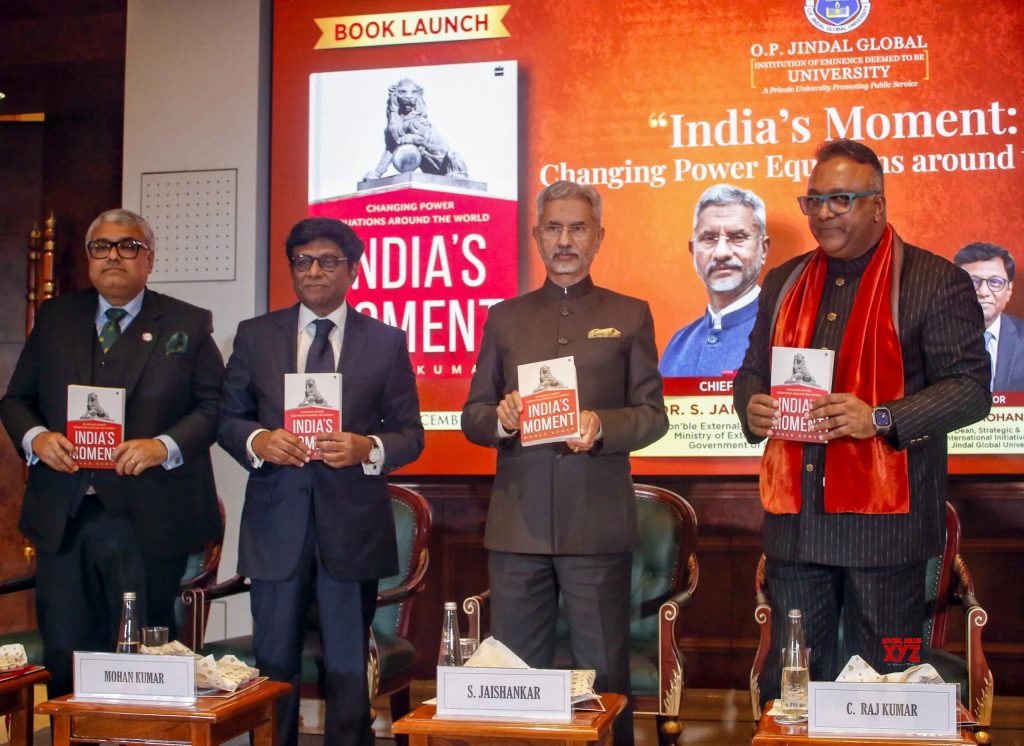
The launch of the book, “India’s Moment,” lived up to its name and provided External Affairs Minister S. Jaishankar an occasion to assert India’s strategic autonomy and debunk the West’s double standards in international trade negotiations.
Unveiling the book, “India’s Moment: Changing Power Equations around the World,” authored by Prof. Mohan Kumar, a former Indian diplomat and veteran trade negotiator, on December 18, Dr Jaishankar exposed sophistry around domestic politics, which is used by Western countries to stall and manipulate trade and climate negotiations. Indian negotiators should not be defensive about their “domestic politics,” he told an audience comprising largely serving and former diplomats at a hall in Bharat Mandapam that served as the venue for the G20 New Delhi summit in September.
“American domestic politics or Western or European domestic politics is often made to appear very reasonable… they can’t do this because they have a big domestic lobby,” said Dr Jaishankar in the context of the politics of trade deal negotiations.
“What about my domestic lobby? How often do we talk about that? So, domestic politics is there in every polity and we should not be defensive about our domestic politics,” said Dr Jaishankar in his gently combative style.
“Well, other countries assert it, often as almost as a baseline of a negotiation… saying, this is my way of life. This may not be absolutely market-based, but you’ve got to accept it because it is cultural, it is social, and is historical. So, that’s my domestic politics.”
In a veiled reference to ongoing negotiations for the India-UK FTA, Dr Jaishankar struck a cautionary note on setting artificial deadlines. “We are now in the middle of some fairly serious negotiations with some fairly serious partners. But again, one reads about that it is going to happen. It’s the last leg, it should happen by Diwali. Why are we holding back?”
“I hear this naysayers narrative coming back. Why isn’t India quickly signing up with the UK? Nobody says why isn’t the UK quickly signing up with me? So, somewhere it is like we have to make that accommodation. We are the people who are holding back and we should speed it up because every FTA and every open step is an achievement in itself.”
Poverty veto
Jaishankar dwelt in detail about the ramifications of a trade deal for a country like India which still has large-scale poverty to deal with. “Now FTAs have a use… I’m not at all in denial, I think… but FTA is at the end of the day, for a country with the per capita income that we have, for a country with the small producers that we do. I would very, very judiciously consider the merits and the risks of an FTA.” In his remarks, Jaishankar also underlined that it is important to look back and introspect on the decisions taken, and keep correcting to set the foreign policy right.
Why India will succeed
India’s changing stance towards trade negotiations is a key theme of Kumar’s book. Kumar, who serves as Dean, Strategic & International Initiatives at O. P. Jindal Global University, said that the book is about explaining to the world why Indian negotiators are difficult and come across as naysayers in international negotiations.
Kumar spoke eloquently about the transformation of India from a naysayer to an indispensable player in the international arena. The book traces India’s journey from a rule-taker to rule-maker in the shifting international landscape. “When India fails, the world fails. That’s why India must succeed,” he said.
In his book, Kumar writes incisively about how India can move from being a balancing power to a leading power. “If India can become a $10 trillion economy, then the geopolitical considerations will become more favourable, since the need for external balancing will diminish accordingly,” writes Kumar.
Author Profile

- Manish Chand is Founder and Editor-in-Chief of India Writes Network (www.indiawrites.org) and India and World, a pioneering magazine focused on international affairs. He is CEO, Centre for Global India Insights, an India-based think tank focused on global affairs.
Latest entries
 India and the WorldFebruary 17, 2026South-by-South: Focus on people-centric solutions at India AI summit
India and the WorldFebruary 17, 2026South-by-South: Focus on people-centric solutions at India AI summit India and the WorldFebruary 7, 2026Modi hails interim India-US trade deal, Goyal says no concessions made on agriculture
India and the WorldFebruary 7, 2026Modi hails interim India-US trade deal, Goyal says no concessions made on agriculture India and the WorldFebruary 2, 2026Trump announces trade deal with India, Modi ‘delighted’
India and the WorldFebruary 2, 2026Trump announces trade deal with India, Modi ‘delighted’ India and the WorldJanuary 31, 2026Palestinian minister bats for mediatory role for India in ending Gaza conflict
India and the WorldJanuary 31, 2026Palestinian minister bats for mediatory role for India in ending Gaza conflict







